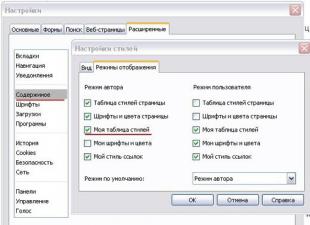Read how to view your browser history online. What programs to use to view and restore Internet browser history. Each user's transition to Internet sites is saved in Browser History, along with all the details: time of visit and search name. This history is available to the user and can, if necessary, be deleted: both completely and individual searches.
2016-10-24 Michael Miroshnichenko
- Read how to fix the error Windows updates. What to do if the update has been downloaded to your computer, but is not installed automatically. Although many users do not consider it necessary to update their computer's operating system...
- Read about portable Windows versions: how to create and download it. How to recover data from using Windows To Go disk or from the disk itself of the portable version of the system. Windows To Go is a new Windows 10 tool that lets you create...
- Read how to quickly and easily clean the system disk of your computer or laptop from unnecessary files. Built in Windows tool Disk Cleanup can quickly clean up system files and thus free up hard drive space. But not...
- Description of top programs for recovering deleted computer data: Recuva, Hetman Partition Recovery, EaseUS Data Recovery, UndeletePlus, R-Studio, Ontrack EasyRecovery. Overview of features and video. Personal computers and laptops, smartphones...
- Read how to properly configure the paging file in Windows. If your computer starts to slow down over time, its performance can be increased by making some changes to the settings. Thin Windows setup, has an important meaning...
Modern social networks and instant messengers have long contained all user correspondence on their servers. he can’t boast about it. So, in order to find the history of correspondence with someone, you will need to delve into the computer’s memory.
ICQ and related instant messengers still store correspondence history on the user's computer. At the moment, a similar approach is already considered obsolete due to the fact that the user will not be able to access correspondence with interlocutors using a device other than the one on which this conversation was originally conducted.
At the same time, it is believed that such a system also has its advantages. For example, in this way information is more protected from outside access, which makes the messenger more closed from outside penetration into the secrecy of correspondence. Moreover, now the developers of all clients are working not only to hide the correspondence history deeper into the depths of the computer, but also to encrypt the files so that it is difficult not only to read, but even to find them among other technical files.
As a result, the history is stored in the computer. Depending on the program that works with the ICQ service, the location desired folder may be different.
History in ICQ
Things are quite difficult with the official ICQ client, since here the developers have done their best to ensure that personal correspondence files are safe.
It is impossible to find out the location of the history file in the program itself. Here you can only set the folder for storing downloaded files.
But the carriers of the history of correspondence are buried much deeper and more complex. Typically, the location of these files changes with each version.
The latest version of the messenger in which the message history can be retrieved without any problems is 7.2. The required folder is located at:
C:\Users\[Username]\AppData\Roaming\ICQ\\Messages.qdb
In the most new version, ICQ 8, location has changed again. According to comments from the developers, this is done to protect information and user correspondence. Now the correspondence is stored here:
C:\Users\[Username]\AppData\Roaming\ICQ\[User number]\archive\
Here you can see a huge number of folders, the names of which are the UIN numbers of the interlocutors in the ICQ client. Of course, each user has their own folder. Each one stores 4 files. File "_db2" and contains the correspondence history. This can all be opened using any text editor.

Any communication here is encrypted. It is possible to extract individual phrases from here, but it will not be easy.

Best to use this file in order to insert it along the same path onto another device, or use it as a backup copy in case your program is deleted.
Conclusion
It is highly recommended to have backups dialogues from the program, if it contains important information. In case of loss, you just need to insert the file with the correspondence where it should be, and all messages will be back in the program. This is not as convenient as reading dialogs from the server, as is done in social networks, but at least it's something.
If you have deleted your browser history and now want to find a previously visited page, then here you will find a real method for restoring the list of visited pages and find out what pitfalls await you on the Internet.
If you are interested in restoring history that was not saved in advance, we recommend reading:
Recovering from a previously saved history
I offer you an option that I myself tested on each of the browsers described below.
You can restore deleted history in the following order:
- Save the history file.
- Copy it to a specially created folder, i.e. make a backup.
- If you deleted your history and want to restore it, return the saved files from backup to the original folder.
First you need to allow Explorer to show hidden folders on your PC. Therefore, go to Explorer, click “Tools → Folder Options”.
In the window that appears, activate the “View” tab and check the box next to the “Show hidden…” line. Click the "Apply" button.
I show the further procedure using the example of Opera. The technology is the same for other browsers. The only difference is the file name and its location, which I will indicate.
Open the AppData folder. You access it through “Users” →<Имя пользователя>. Do not leave it until the end of the article.
Opera
Find the file History. Go to it through the folders: Roaming → Opera Software → Opera Stable.
Copy it to any folder on your hard drive. It will be backup file history. Now, if you clear the list of visited pages in your browser, it can be restored. To do this, do this:
- Close Opera.
- Copy the backup file to the source folder, i.e. Opera Stable .
- You launch the browser and rejoice at the returned list of web pages.
Make such a backup regularly, and you will not have problems returning the list of visited pages.
Mozilla
Do you need a file places.sqlite. Here again go to Roaming, and then to Mozilla → Firefox → Profiles. If you see a subfolder in Profiles, don’t be alarmed: places.sqlite inside her.
Google Chrome
Here the file is called History. Go to it along this path: Local → Google → Chrome → User Data → Default .
Yandex Browser
The file is named History. The path is as follows: Local → Yandex → YandexBrowser → User Data → Default.
If you were looking on the Internet for how to recover deleted history, you might have come across recommendations from would-be specialists who themselves have not tried on a computer what they advise others to do. Following their methods, you can only kill time and scold yourself for the fact that absolutely nothing is possible. And the reason is not in you, but in the source of information.
I tested the methods described on the Internet myself. I will say that without preliminary measures taken, you will not be able to return the list of visited pages.
The reason is simple - this list is saved in specific file, which is overwritten when you click the Clear History button, but is not deleted.
What should you not spend time on?
I'll show you the pitfalls you can run into
DNS cache is not browser pages
If you decide to save the situation using a DNS cache, then in this way you can see a list of all the sites that the computer accessed, but you cannot restore the browser history.
To make sure of this, write to command line ipconfig /displaydns and find out who your PC is “talking” to behind your back. But you won't find the pages you need.
System or History Restore?
If some website says that you can apply Windows utility“System Restore” will help in another case, but you will not get back the list of visits.

Contained on the servers of Microsoft, which is its current developer. This means that the user cannot completely delete his message. You can turn off its display, but the interlocutor will still be able to see the information that there was a message before. Editing it is also available, also with a note. However, all messages can be exported to a separate file.
The need to save data appears when transferring the program to another computer; this function will also be useful when using multiple accounts or for cataloging data.
Accessing user data on Skype
You can access Skype data on your own computer or laptop by exporting messages to a CSV file. But there is a separate document main.db, messages are also recorded in it. It will come in handy when reinstalling a system or program.
Option 1: Separate program file
There is a special file where Skype stores the history of user correspondence. It is located in a hidden category that cannot be viewed unless special settings have been made.
But you can get to it using a quick call. Click  , and then paste %AppData% into the text field,
, and then paste %AppData% into the text field,  then confirm. Expand the Roaming or Local directory, and then Skype and go to the folder with the Username. The main.db document is located there.
then confirm. Expand the Roaming or Local directory, and then Skype and go to the folder with the Username. The main.db document is located there. 
You can view it in the program SkypeLogView or similar software. If you plan to reinstall the program, then move the file to a convenient folder, and then return it to its place.
Option 2: Export using Skype
All received and sent messages, Skype history, on account can be combined into one file and saved on the user's computer. This can be done from Skype itself. Launch the program and go to the settings menu from the “Tools” tab.  Expand the “Chats and SMS” section, and then “Chat Settings”. Click on the additional settings item.
Expand the “Chats and SMS” section, and then “Chat Settings”. Click on the additional settings item. 
Activate the "Export chat history" option. Then you need to specify the future location and name for the file. It is saved in CSV format. You can open it for viewing using special program or web resource. The easiest way is to go to the website convertcsv.com, upload the file there and view its contents. 
Attention: not all data will be displayed correctly; various symbols and incomprehensible codes may appear. Some messages cannot be displayed due to links or emoticons.
Sometimes it happens like this - I accidentally came across a certain site on the Internet, but immediately did not pay much attention to it and did not attach any significance to the find. And suddenly, a week later, I needed exactly the information that was published on this resource.
How can you now find the information you need? I don't remember the website address. The resource has not been bookmarked. There is a solution - find the desired web page in your browser history.
Now viewing the history of actions on the computer will depend only on whether browsing history is configured or whether, in the interests of protecting personal data, all surfing was carried out in Private mode. It may also be necessary to see whether the computer was running at a certain time.
View your browsing history
To find the desired page in the browser, you need to take the following steps
- Launch the browser.
- Enter the Tools or Settings menu (this depends on the type of browser).
- Open the History item.
By looking through the entire list of visits in a row, in the end, you will be able to find the desired page and site. After that, you need to click on the link and in a minute the lost information is before your eyes.
Indeed, a convenient thing. Provided that the user is not afraid of surveillance and is not worried that information about the sites visited may fall into third hands.
Browser Mozilla Firefox
In this browser, the history is called “Log”. The magazine is located directly in the Firefox menu.

Opera browser
In Opera, the tab is called “History”. When viewing history, you can use a convenient search.

Google Chrome browser
In Google Chrome, you can view your browsing history in the “History and recent tabs” menu item.

Personal data protection issues
If the user is interested in maintaining the privacy of surfing, then you can completely disable saving your browsing history in the browser settings.
If you want to hide the history of a single visit to the site from indiscreet eyes, then the easiest way before starting surfing is to select the Private browsing option in the browser’s File menu. In this case, the history will not be saved only for this surfing session.
History of working with documents in applications
If you are not interested in surfing the Internet, but what files you worked with lately, in this case the problem is completely solvable. Again - unless saving file opening history has been disabled.
Many applications such as text editors, graphics programs save the history of working with documents. Typically, at the very bottom of the File menu, a list of the last 10 working documents is shown.
Number of saved open files can be configured in the Program Options using the system capabilities of the computer. You need to open the Start menu and find Recent Documents. There will be a list of files that have been worked with in recent days. Again, unless the Start menu settings prohibit saving history.
View a complete history of all events on your computer
Windows Event Log
Windows has a special log where a great many events are stored. There you can see when the computer turned on, what updates were installed, what failures occurred, and so on.
In order to get into this log, you need to open the Control Panel, open “Administration” in it, and then double-click on the “Event Viewer” shortcut. And you find yourself in a journal in which you can view many entries. It would take too long to describe all the possibilities. Open it for yourself and see how much data there is.

Third-party software for viewing history
Unfortunately, in operating systems There is no option to view all events in full. The problem is solved by installing a special software eg History Viewer.
We are not talking about spying and spying at all. Programs for monitoring activity on computers are usually used by employers to monitor performers - the client wants to know how work on the project is going.
In Western countries, the hourly method of payment for work is common. So that the customer can check whether all paid hours have actually been worked in good faith, a tracker program is installed on the contractor’s computer, which sends the client a screenshot from the desktop screen every few minutes.
Other types of programs can collect an absolutely complete history of all events on the controlled computer:
- What programs worked, when and for how long.
- How much Internet traffic does each program consume?
- What sites were visited?
- How long did it take to edit the document in the editor?
- And much more, from which the employer can draw conclusions about the employee’s integrity.
Some of these trackers are intended for professional use in offices and production - the program is installed on the computers of all employees with the results displayed on a monitor in the office of the boss or other supervising responsible employee.
Based on the results of work periods, such programs automatically generate reports and graphs, diagrams on which you can clearly see what percentage of the employee’s working time was spent working on tasks, and how much time was spent on Odnoklassniki.
Parental Controls
Advanced parents install such activity monitoring programs on their home computer to keep an eye on their child.
- How much time did you spend studying?
- How much did you play computer games?
- Who did you communicate with on social networks?
- Did you do anything forbidden?
On the other hand, there have been cases where advanced children conducted such monitoring of their parents. And then they blackmailed moms and dads into buying something or demanding a relaxation of the regime.
 uptostart.ru News. Games. Instructions. Internet. Office.
uptostart.ru News. Games. Instructions. Internet. Office.


